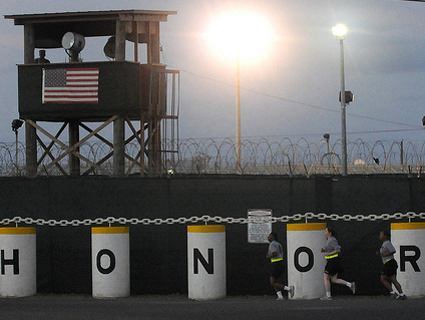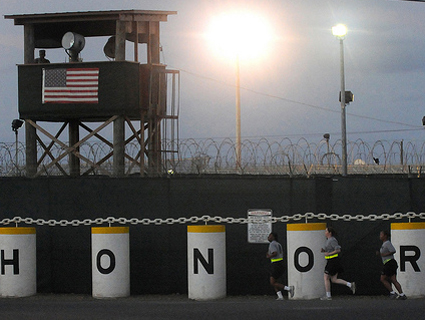
A US National Guard member guards the Guantanamo Bay detention camp. <a href="http://www.flickr.com/photos/thenationalguard/5343896666/" target="_blank">Flickr/National Guard</a>
The number of former Guantanamo detainees suspected of involvement in terrorist activity following their release from the detention camp has plummeted since President Obama took office, according to a new report from the Office of the Director of National Intelligence.
The report notes that, since 2002, 15.8 percent of former Gitmo detainees are “confirmed” as having “returned to terrorist activity,” while 12.1 percent are “suspected” of engaging in terrorism. During the Bush administration, the confirmed and suspected numbers were 17.3 and 13.5 percent, respectively. The Gitmo “reengagement” rate fell dramatically under the Obama administration, with only 4.3 percent confirmed and 1.4 percent suspected of “reengaging” in terrorism-related activities.
Source: Mother Jones
There are two factors that may explain the drop: When Obama took office, his administration discovered that its predecessor lacked “comprehensive case files” on the detainees held at Gitmo. The administration convened a task force to examine all the detainee cases at Gitmo shortly after the president took office, so the government may now have a better idea of who the detainees are and what their connection to terrorism might be (if any). Congressional restrictions on detainee transfers, imposed since the 2010 lame duck session, have also made it increaslngly difficult to release or transfer detainees out of Gitmo under any conditions. More than 500 detainees were transferred (but not necessarily released) out of Gitmo under the Bush administration, compared to 70 under Obama. The “reengagement rate” reported by the DNI is far lower than the one established in controversial report by the House Armed Services Committee last year, which pegged the rate at 27 percent. That report, which House Democrats criticized as flawed, conflated “suspected” and “confirmed” cases.
Source: Mother Jones
The numbers are already fairly low when you consider that US prisons have close to a two-thirds recidivism rate. But the government’s definitions of “confirmed” and “suspected” are somewhat loose as well. Ex-detainees are “confirmed” of involvement in terrorist activity based on whether the government deems that “a preponderance of information” shows they were “directly involved in terrorist or insurgent activity.” To make the “suspected” list, all the government requires is “plausible but unverified or single-source reporting.” The definition of “reengagement” is itself problematic, since very few detainees at Gitmo have been convicted of a crime in any venue, military or civilian.
Democrats reiterated their intention to close Gitmo in their 2012 platform, but they currently don’t have the votes to do it (and they didn’t take action when they did have the votes). Republicans have successfully leveraged the fear of terrorists escaping from domestic prisons, making the politics of closing Gitmo toxic. So even in an age of austerity, with a low “reengagement” rate, Gtimo, which costs $800,000 a year per detainee, will almost certainly remain open.












